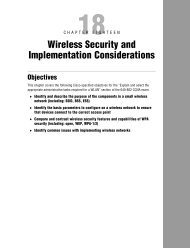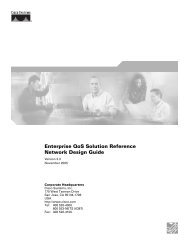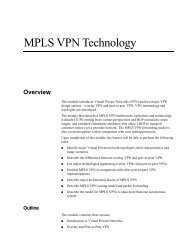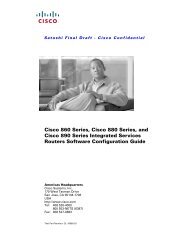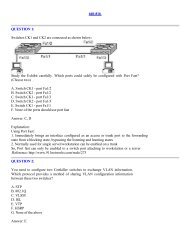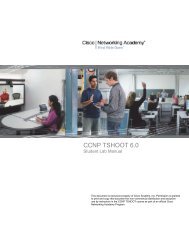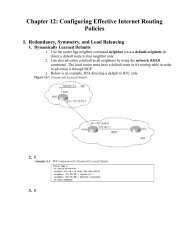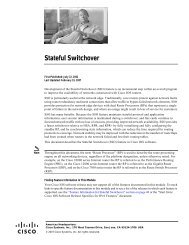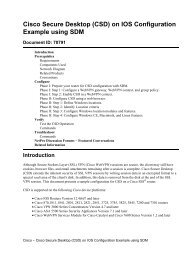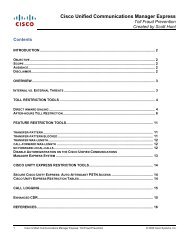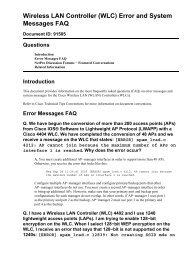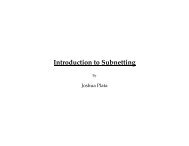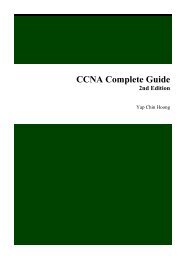Cisco Unified Contact Center Enterprise Solution Reference ...
Cisco Unified Contact Center Enterprise Solution Reference ...
Cisco Unified Contact Center Enterprise Solution Reference ...
Create successful ePaper yourself
Turn your PDF publications into a flip-book with our unique Google optimized e-Paper software.
<strong>Cisco</strong> <strong>Unified</strong> CallManager Redundancy<br />
10-8<br />
<strong>Cisco</strong> <strong>Unified</strong> <strong>Contact</strong> <strong>Center</strong> <strong>Enterprise</strong> 7.x SRND<br />
Chapter 10 Sizing <strong>Cisco</strong> <strong>Unified</strong> CallManager 4.x and 5.x Servers<br />
Table 10-1 lists the types of servers you can use for <strong>Cisco</strong> <strong>Unified</strong> CallManager for <strong>Unified</strong> CCE<br />
deployments, the main characteristics, and typical agent limits. These limits are not guaranteed to be<br />
possible in all deployment scenarios, but in normal call center deployments, these limits are typically<br />
possible. However, in all cases you must use the <strong>Cisco</strong> <strong>Unified</strong> CallManager Capacity Tool to verify that<br />
a specific system design will be supported.<br />
Table 10-1 Types of <strong>Cisco</strong> <strong>Unified</strong> CallManager Servers that Support <strong>Unified</strong> CCE<br />
Server Type Characteristics <strong>Unified</strong> CCE Recommendation<br />
Standard server:<br />
Single processor<br />
Up to a maximum of 100 agents<br />
MCS-7825<br />
Single power supply (not hot-swap)<br />
Non-RAID hard disk (not hot-swap)<br />
(Not recommended for mission-critical<br />
call centers above 50 agents)<br />
High-availability standard server: Single processor<br />
Up to a maximum of 250 agents<br />
MCS-7835 with battery-backed<br />
write cache (BBWC) installed<br />
Redundant power supplies (hot-swap)<br />
Redundant SCSI RAID hard disk array<br />
(hot-swap)<br />
(Maximum of 125 agents without<br />
BBWC installed)<br />
High-performance server:<br />
Dual processors<br />
Up to a maximum of 500 agents<br />
MCS-7845 with battery-backed<br />
write cache (BBWC) installed<br />
Redundant power supplies (hot-swap)<br />
Redundant SCSI RAID hard disk arrays<br />
(hot-swap)<br />
(Maximum of 250 agents without<br />
BBWC installed)<br />
The <strong>Cisco</strong> MCS-7815 server is not supported with <strong>Unified</strong> CCE deployments, but lab or demo setups<br />
can use this server. It is, however, a supported <strong>Cisco</strong> <strong>Unified</strong> CallManager platform for <strong>Cisco</strong><br />
<strong>Cisco</strong> <strong>Unified</strong> Communications deployments only.<br />
<strong>Cisco</strong> <strong>Unified</strong> CallManager Redundancy<br />
With <strong>Cisco</strong> <strong>Unified</strong> CallManager, you can choose from the following two redundancy schemes:<br />
2:1—For every two primary subscribers, there is one shared backup subscriber.<br />
1:1—For every primary subscriber, there is a backup subscriber.<br />
Due to the higher phone usage in contact centers and the increased downtime required during upgrades,<br />
the 2:1 redundancy scheme is not recommended for CallManager deployments with <strong>Unified</strong> CCE.<br />
Figure 10-1 illustrates these two options. This illustration only shows call processing subscribers and<br />
does not show publisher, TFTP, music on hold (MoH), or other servers. For details on additional cluster<br />
deployment and redundancy options, refer to the latest version of the <strong>Cisco</strong> <strong>Unified</strong> Communications<br />
<strong>Solution</strong> <strong>Reference</strong> Network Design (SRND) Guide, available at www.cisco.com/go/srnd.<br />
OL-8669-05



